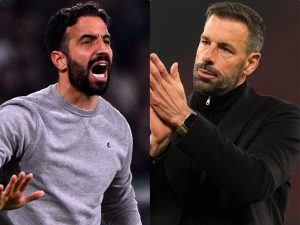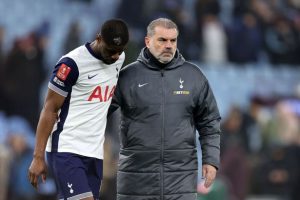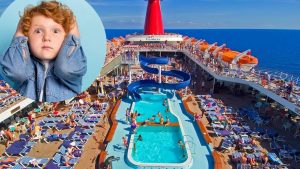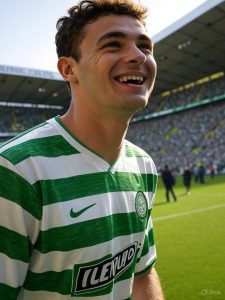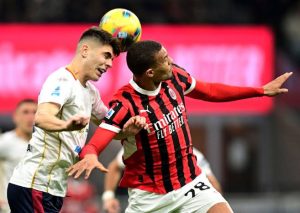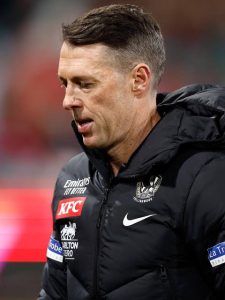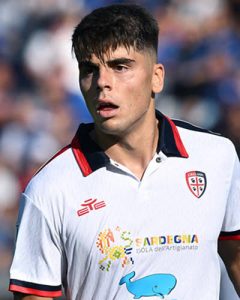One of Manchester United’s greatest acquisitions ever was made on July 29, 1996. They were connected to Alan Shearer once more over that summer. How times have changed: Newcastle United, United Premier League title rivals at the time, demanded a world record £15 million from Blackburn Rovers to allow him depart for Old Trafford. Sir Alex Ferguson had to find a new target after missing out on the prolific goalscorer, and he succeeded.
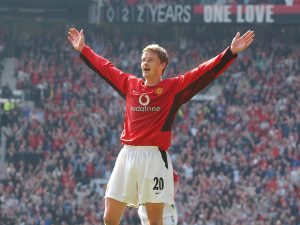
Gunnar Solskjaer, Ole. Unknown outside of Norway, it was anticipated that he would support Andy Cole, who had signed the previous year, as well as Eric Cantona. Solskjaer made his Manchester United debut on August 25, 1996, and he scored his first goal in a 2-2 draw with the 1994–1995 champion Blackburn Rovers.
Soon after arriving at Old Trafford, Solskjaer was expected to be a starter rather than a reserve player. Despite being a “super-sub,” Solskjaer, often known as the Baby-faced Assassin, had a strong debut season, scoring 19 goals in all competitions. United won the FA Community Shield early in the season and kept their Premier League championship.
At around £1.5 million, Solskjaer was the best Premier League signing of the season and was moving quickly. In today’s currency, it would be roughly £2.6 million, which is still a great deal given the value of what you get. The following season, Arsenal triumphed and won their first Premier League crown, their eleventh league title, levelling United’s eleven titles but leaving them well behind Liverpool, who had won eighteen titles at the time, the same as they do now. This prevented United from winning the Premier League trophy three times in a row.
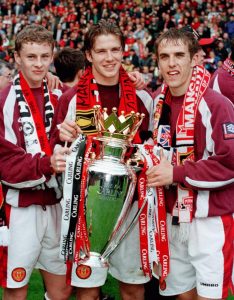
Although it was still not a huge accomplishment at the time, United did win the FA Community Shield that season. With just nine goals in his debut season, Solskjaer was far from stellar. The 1998–1999 season was going to be Manchester United’s greatest season ever. It was time to get their trophy back from Arsenal and move on to more ambitious goals.
On the 41st anniversary of the Munich Air Disaster, Solskjaer memorably scored four goals in an 8-1 victory over Nottingham Forest, coming off the bench. He scored eighteen goals in all competitions before the end of that season, one of which was really spectacular. The ball was placed in the German net by whom? Gunnar Solskjaer, Ole.
Man Utd arrived in the promised land in the 1998–1999 season. United finished one point ahead of their rivals to reclaim the title from Arsenal. A week later, Paul Scholes and Teddy Sheringham scored goals as United defeated Newcastle United 2-0 at Wembley to win the FA Cup. It was the first double since the 1995–1996 campaign, but this one was particularly memorable. At the Nou Camp in Barcelona, United was playing Bayern Munich in the UEFA Champions League final.
United finished second in a group that included the German team, Barcelona, and Brøndby, behind Bayern Munich. United defeated Juventus 4-3 on aggregate and Inter Milan 3-1 on aggregate in the final stages. The only other English team to achieve a treble is still United. The only significant European team to win the triple crown twice is Barcelona. On the day that Sir Matt Busby would have turned 90, United got their name on the trophy thanks to Sheringham and Solskjaer.
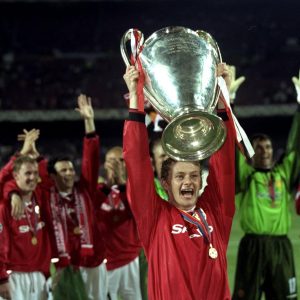
After that, United won the Premier League title three times in a row (1998–1999, 1999–2000, and 2000–01); however, in the 2001–2002 season, Arsenal broke that record. That season, Solskjaer recorded his highest goal total for the team with 25 goals in all competitions. He was going to suffer an injury that would end his career, therefore the next season would be his last full season with the team. Solskjaer had to have extensive knee surgery in August 2004, which prevented him from playing in the 2004–05 season.
When Solskjaer returned in the 2005–06 season at the age of 32, he made five appearances without recording a goal. The fans of United erected a banner at Old Trafford that said “20 LEGEND,” expressing to the player their feelings for him. In his final campaign as a player, the 2006–07 campaign, Solskjaer made 32 appearances and scored 11 goals, both of which came against Blackburn Rovers in a 4–1 thumping at Old Trafford.
During his training with Norway, Solskjaer experienced knee soreness, which led to minor surgery on June 5, 2007. Despite the successful surgery, Solskjaer did not fully heal and on August 27, 2007, he announced his retirement from the game. Following his retirement, Solskjaer was given credit for scoring the most goals for Manchester United coming off the bench (28), as well as the most goals in the Premier League when substituting (17), records that have since been exceeded by Jermain Defoe.
Less than a year later, Solskjaer received a testimonial. The match took place on August 2, 2008, at Old Trafford, and almost 69,000 fans showed out, making it the second-highest attendance for a testimonial in British history. The winning goal was scored by Frasier Campbell as United defeated Espanyol. Carlos Tevez was replaced by Solskjaer in the 68th minute of play. He thanked the supporters, the players, the staff, and his family in front of the enthusiastic United supporters.
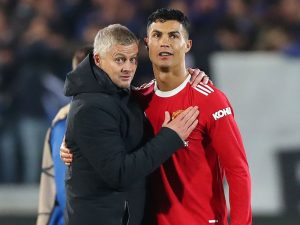
However, Ole Gunnar Solskjaer and Manchester United have more ahead of them. Since Solskjaer was a skilled goal scorer, they would have benefited from his tutoring of the strikers during the 2007–08 season as one of Sir Alex Ferguson’s assistants. After the season, Solskjaer was appointed manager of Manchester United Reserves, overseeing the team that would become the U23s (formerly the U21s).
Jimmy Ryan and Brian McClair were replaced as the club’s first full-time reserve team managers by Solskjaer. While in charge of United’s reserves, Solskjaer won the Premier Reserve League North in 2008–09, the Manchester Senior Cup in 2009, the Lancashire Senior Cup in 2008–09, and the Premier Reserve League (which had separate north and south divisions in the past) in 2010.
After leaving Manchester United in November 2010 to rejoin his old team Molde, Solskjaer managed the latter until January 2014, at which point he moved to Cardiff City, where he served until September of the same year. Molde has been managed by Solskjaer once more since October 2015. One player that has been missed is Solskjaer.
With 366 appearances and 126 goals throughout his time at Manchester United, he scored a goal every three games, which is a respectable scoring record, especially considering the little price Manchester United and Sir Alex Ferguson paid for him. Following Jose Mourinho’s dismissal from the team in December, Solskjaer took over as interim manager and produced some positive on-and off-field outcomes.
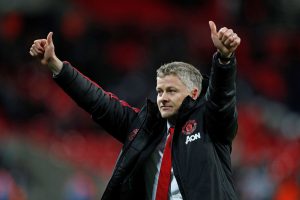
Since taking over as interim manager following Mourinho’s dismissal in December 2018 and signing a permanent contract in March 2019, Solskjaer has overseen 99 games for United. The United boss has received a lot of flak, with some people allegedly fabricating an agenda to disparage the Norwegian manager by claiming that he is a PE instructor without any strategy.
True, he hasn’t had a great time at the club, and if it were, I would be concerned. After exerting every effort, Solskjaer began to assemble the proper team, which in turn fostered the right mindset within the organisation. which, considering the disaster David Moyes, Louis van Gaal, and Jose Mourinho left behind, we can all agree was necessary. For Solskjaer, too, it was simply not meant to be.
Solskjaer handled 168 games for the team, with 91 victories, 36 draws, and 41 losses. Not bad considering that in all competitions, United scored 308 goals while giving up 273 goals. But taking into account that David De Gea was not at his best for a considerable amount of time and that United had numerous defensive injuries in the early going of Solskjaer’s reign, it appears that he is returning to his best form.
Despite a dismal start to the season, United are still a work in progress, and under Ralf Rangnick’s direction—who took over as temporary manager following Solskjaer—they have a decent chance of making progress this year. Even though the team isn’t quite ready to compete with teams like Manchester City, Liverpool, or even Chelsea, something is changing at the team as injustices begin to be made right.
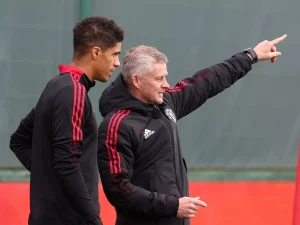
Granted, that might be something that many people find unfeasible under the Glazers, who are terrible owners who simply want to steal as much money as possible from the team—more than the amount they paid to leverage the team when they bought it—leaving the team in debt for the previous 17 years. Given that things are not as bad as many who are against him suggest, United should be grateful for Solskjaer, who did not appear to be the main issue at the team.
Even though it was heartbreaking to see the Norwegian depart the team in November 2021, he will always be remembered as a legend there. Some of the club’s so-called supporters will hold him accountable for everything, despite the fact that the issues still exist and existed before Solskjaer rejoined after Mourinho. There is a manager out there who could do it with the club’s owners, despite the fact that some fans would view him as the one who failed to bring United back from the dead.
The fact that Solskjaer’s name will probably always be chanted on the Old Trafford terraces and anywhere else United plays simply goes to show how much of an influence he made as a manager and player for the team. United has the appropriate path laid out for them; nevertheless, the club’s owners must make sure they stick to it and eventually return to their previous level.
But, since the Premier League prize money does not much differ between first and seventh place, the Glazer family does not need United to win trophies in order to continue funding the team through dividends, share sales, and who knows what other financial initiatives they have in the works. The primary issue that has to be addressed is that United is a cash cow club. It is inevitable that managers will change, but the Glazer family, who have been the mainstay since the summer of 2013, will never accept responsibility for it.
Authored by John Walker
